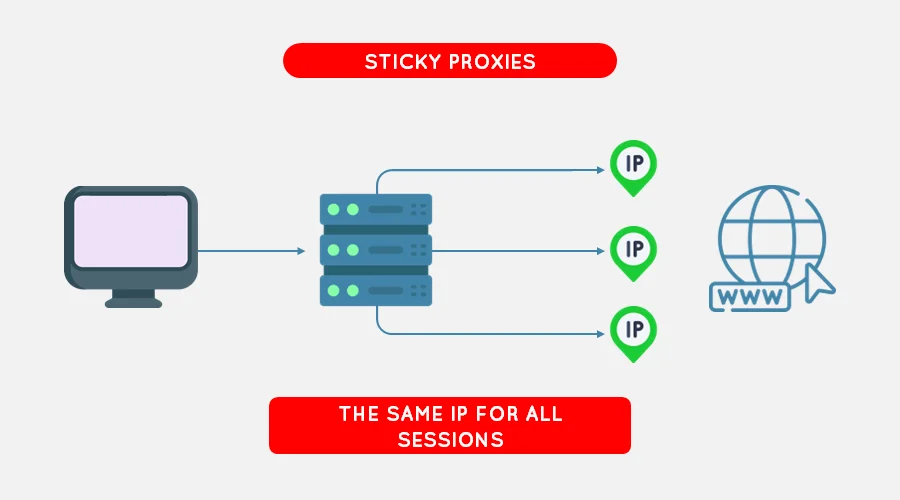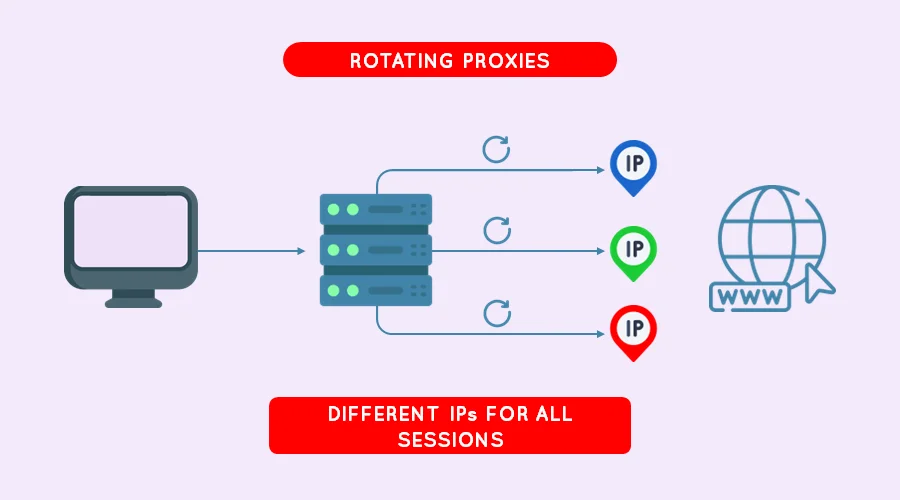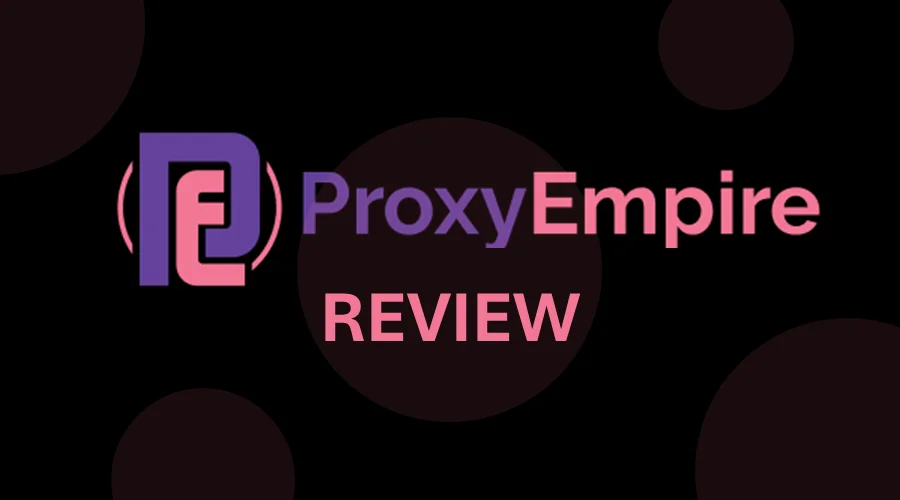Sticky vs Rotating Proxies: Which One to Use?
5 min. read
Updated on
Read our disclosure page to find out how can you help VPNCentral sustain the editorial team Read more

Sticky vs rotating proxies – without knowing the difference, you might not pick the right type for your needs.
Guess what? You’re not alone.
I also learned the hard way as a novice. And today, I’ll save you all that trouble.
You’ll learn all about what they are and how they work. Moreover, I’ve included each use case to help you choose better.
Let’s get down to business.
Sticky vs rotating proxies: what’s the difference?
Both sticky and rotating proxies hide your IP to boost privacy. But their approach is different.
Take a closer look:
What is a sticky proxy?
A sticky proxy, also known as a static proxy, allows web access using a single IP address. It’s often assigned to the user for a specific duration.
As such, the term ‘sticky’ refers to the IPs remaining fixed without changing. It can be for 10 minutes, 30 minutes, or even longer.
This consistency offers stability, especially for activities that require persistent contention for multiple requests. Without it, such tasks might fail due to a sudden change of addresses.
How it works
Sticky proxies maintain the same IP address for the duration of the session. As I mentioned above, this can range from a few minutes to several hours.

Each time you’re on the internet, requests route through the same proxy. This consistency also helps improve multiple interactions online over a short period.
For instance, navigating through a website’s multiple pages reduces the likelihood of triggering anti-bot measures. That’s because a sticky proxy makes you appear as a legitimate user, which enhances trust.
What is a rotating proxy?
A rotating proxy, in contrast, offers a dynamic approach. With every connection request, it assigns you a new IP address.
The IPs come from a pool of addresses that change at random intervals. This means that if you access a website several times, each visit will have a unique IP.
Rotating proxies offer flexible geolocation switching for enhanced privacy. You’ll find this ideal for conducting tasks that require high anonymity.
How it works
Rotating proxies work through backend serves, which act as intermediaries. These connect you to a vast pool of proxy addresses within the network.

During a session, a proxy rotator software handles the bulk work of changing IPs. This takes place for every request or as per the configured time frame.
The undertaking makes it extremely challenging to track your activities. Additionally, most vendors offer anti-flagging mechanisms to help evade online bans.
So…
Which should you use?
Use the pointers below if you’re still wondering which one to use.
When to use sticky proxies
Sticky proxies are ideal for tasks that require a consistent IP address for short durations. Some use cases include:
- Home use: Sticky proxies are reliable for occasional web browsing, streaming, and online gaming. But you may consider switching to a VPN for better security and privacy.
- Social media management: They’re ideal for individuals handling multiple social media accounts. A dedicated static proxy for each account can prevent blocks on IP-sensitive platforms.
- Manual marketing research: Frequently gathering data from specific locations or sources benefits from a static IP, especially given the dynamic nature of marketing data.
- Multi-step processes: Online activities that require multiple actions need a consistent IP to prevent disruptions. Examples include filling out multi-step forms, navigating multi-page websites, completing online checkouts, etc.
When to use rotating proxies
Rotating proxies shine in scenarios where high-volume, rapid requests are necessary. This is common, especially when scraping the web for data.
The use cases include:
- Web scraping: Extracting data from websites requires rotating IPs to avoid detection. Some information you can extract includes product descriptions, commodity prices, flight data, etc.
- SEO monitoring: Rotating proxies are ideal for tracking keyword positions on search engines. They allow you to access data from various geo-locations without being flagged.
- Avoiding rate limits: Websites with anti-scraping measures often limit requests from a single IP. Rotating proxies circumvent this by using different addresses for each query.
Now that you know the differences and use cases, here’s a list of the best providers you can choose from:
Best sticky and rotating proxy providers
Finding a reliable provider can be tricky. Below are some of the best proxy services to get you started:
- Decodo: Offers over 65 million IP addresses across 195+ locations. It’s perfect for web scraping, social media management, and bypassing geo-restrictions. The vendors’ competitive pricing makes it ideal for both beginners and seasoned professionals.
- Oxylabs: The vendor has a wide range of residential, mobile, and data center proxies. It additionally provides advanced tools for controlling sessions and rotating IPs. Catering mainly to businesses, it’s ideal for large-scale web scraping and market research.
- Bright Data: Formerly known as Luminati, Bright Data is a market leader in the proxy industry. It boasts over 80 million residential, mobile, and data center IPs. It’s a top choice for enterprises requiring high-performance proxy solutions.
- IPRoyal: Provides residential proxies known for their speed and reliability. They’re ideal for lightweight tasks like browsing, bypassing geo-blocks, and data gathering. The vendor suits individuals and businesses looking to access geo-restricted content or conduct market research.
- NetNut: This is a fast-rising proxy provider, perfect for beginners and SEO agencies. It offers a user-friendly interface and tons of tools to supercharge web scrapping. NetNut also runs on DiViNetworks, which is fast, stable, and reliable.
Summary
This sticky vs rotating proxies comparison should help you choose better. As you’ve seen, they’re different and suit diverse use cases.
To recall, go with the first option if you’re into conducting IP-sensitive tasks. Examples include social media management, market research, and multi-step online activities.
The second one is ideal for handling data-heavy projects. These include SEO monitoring, web scraping, data gathering, etc.
Easy, right?







User forum
0 messages